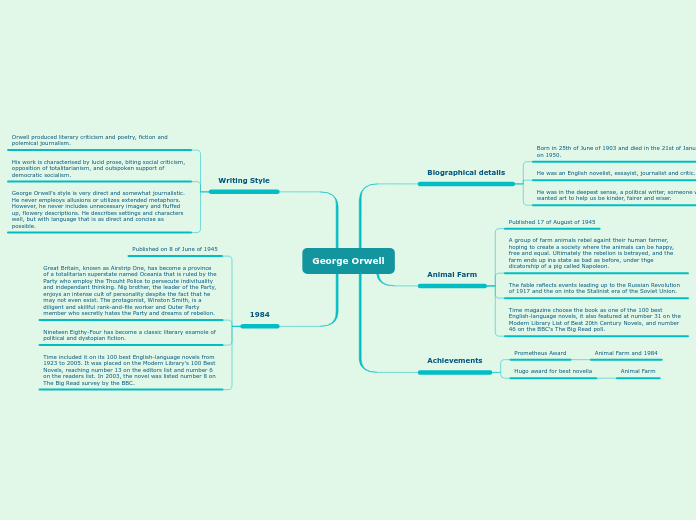George Orwell
Biographical details
Born in 25th of June of 1903 and died in the 21st of January on 1950.
He was an English novelist, essayist, journalist and critic.
He was in the deepest sense, a political writer, someone who wanted art to help us be kinder, fairer and wiser.
Animal Farm
Published 17 of August of 1945
A group of farm animals rebel againt their human farmer, hoping to create a society where the animals can be happy, free and equal. Ultimately the rebelion is betrayed, and the farm ends up ina state as bad as before, under thge dicatorship of a pig called Napoleon.
The fable reflects events leading up to the Russian Revolution of 1917 and the on into the Stalinist era of the Soviet Union.
Time magazine choose the book as one of the 100 best English-language novels, it also featured at number 31 on the Modern Library List of Best 20th Century Novels, and number 46 on the BBC's The Big Read poll.
Achievements
Prometheus Award
Animal Farm and 1984
Hugo award for best novella
Animal Farm
Writing Style
Orwell produced literary criticism and poetry, fiction and polemical journalism.
His work is characterised by lucid prose, biting social criticism, opposition of totalitarianism, and outspoken support of democratic socialism.
George Orwell's style is very direct and somewhat journalistic. He never empleoys allusions or utilizes extended metaphors. However, he never includes unnecessary imagery and fluffed up, flowery descriptions. He describes settings and characters well, but with language that is as direct and concise as possible.
1984
Published on 8 of June of 1945
Great Britain, known as Airstrip One, has become a province of a totalitarian superstate named Oceania that is ruled by the Party who employ the Thouht Police to persecute indivituality and independant thinking. Nig brother, the leader of the Party, enjoys an intense cult of personality despite the fact that he may not even exist. The protagonist, Winston Smith, is a diligent and skillful rank-and-file worker and Outer Party member who secretly hates the Party and dreams of rebelion.
Nineteen Eigthy-Four has become a classic literary examole of political and dystopian fiction.
Time included it on its 100 best English-language novels from 1923 to 2005. It was placed on the Modern Library's 100 Best Novels, reaching number 13 on the editors list and number 6 on the readers list. In 2003, the novel was listed number 8 on The Big Read survey by the BBC.
